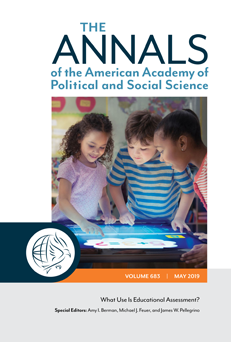Testing tools are taking an increasingly large and often questionable role in American teaching, learning, and schooling. They are used to assess learning and achievement, to influence curriculum and instruction, to hold students and their teachers accountable for results, to guide decisions about placement at various levels of education, and to inform cross-national comparisons of educational systems. But are they appropriate and effective in every one of these uses? How should we assess the effectiveness of our own assessments?
Our political history, a growing regard for evidence-based policymaking, and advances in the science of measurement put testing and assessment at the center of the current discussion about education policy. The articles collected in the May 2019 volume of The ANNALS focus on the benefits of appropriately used tests and assessment tools, as well as the risks of inappropriate applications; and they look ahead to how the sciences of teaching, learning, and cognition, joined with contemporary theory and technology in measurement, might lead to more appropriate and beneficial uses of assessment.

